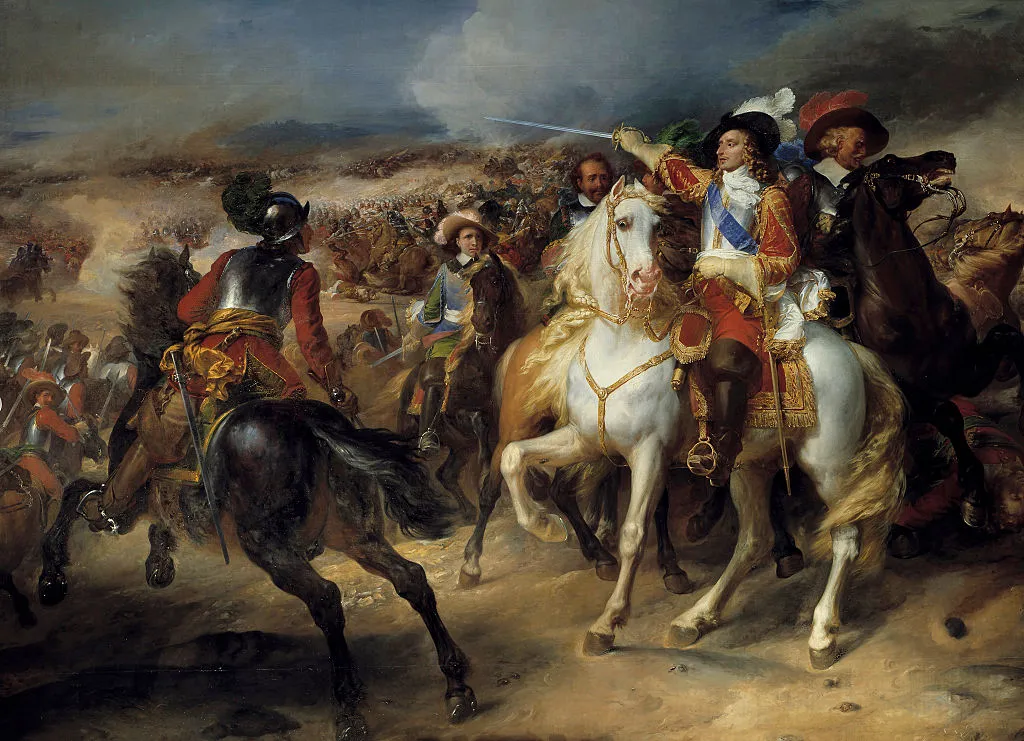This article is a waste of time to everyone except the 500 people who listened to the series, and those people won’t care because they are already riding the beam and obviously engaging in history and politics in a completely different way from the author.
from the conclusion:
It seems that, contrary to the premise of Hell on Earth, the Thirty Years’ War and the origins of capitalism have little to do with each other. The war may have produced or at least influenced the development of many things — the absolutist state and the maintenance of European standing armies being perhaps the most plausible developments on this score. However, the war’s economic impact was overwhelmingly, in a word, destruction. It certainly did not play any creative role in midwifing a new capitalist mode of production, whatever the war’s other impacts. Therefore, it can be said that Hell on Earth succeeds as an introduction to the history of the Thirty Years’ War, but fails to make any defensible analytical statement about the war’s relation to capitalism.
Why not Daniel Colligan, PhD candidate in sociology at the CUNY Graduate Center? He never answers this outside of gesturing at Wallerstein and Brenner.
I had much more written up but decided it, too, was a waste of everybody’s time.
I’m very confused by his portrayal of Matt’s point. I thought Matt’s point was that the unprecedented levels of chaos and destruction in the Thirty Year’s War created the need for the absolutist administrative state and standing armies, all of which needed a new economic model that could sustain it, which by necessity, birthed capitalism, which then eventually devoured it’s father. The very destruction present itself created the drive of creation.
Right, it almost seems like the author is saying the Thirty Years War could only have “produced” (which I don’t think was ever the stated position of the series) capitalism if the economic impact of the war is positive? He seems to be looking for some sort of description of a new mode of production being constructed rather than the negation of the old one.
I don’t agree with Brenner, I think the original works from Postan are much more consistent with a materialist interpretation, basically primitive accumulation and demographic changes lead to the development of proto capitalist forms. His example is the 100 years war, by the begining of the 14 century we see the development of banks and finance in England, as well as large merchant capital, but once the plague hits, even if the war was still going on, the demographic basis for these institutions is no longer there, rich merchants buy land and titles, other landlords stop managing their states and ether sell them or rent them the banks and Italian creditors disappear or become much less relevant. The volume of trade decreased and merchants and manufacturers formed guilds to protect their shares of a diminishing pie.
Once population recovered, mpl fell and it became easier to extract sulprus value from laborers and accumulation started again. It was not a crisis, but the fact that an agrarian crisis like the one in the 1300s was averted by the discovery of the americas, that enabled primitive accumulation to continue. Even with the addition of india, the system was about to collapse in the early 1800. Had the industrial revolution been delayed a few decades, we’d be back at the 14th century.
I would be curious.
It produced absolutism, idk about capitalism. I haven’t listened to the podcast yet but have they ever addressed Ellen Meiksins Wood’s thesis of English agrarian capitalism? Basically, she says that capitalism has already came into being in England by early 17th century and the absolutist states of western Europe were not stepping stones to capitalism but alternatives to it - they were a way of preserving feudalism in some form.
I believe that Matt’s general argument was that England had it’s own political crisis, which was similar, but far less destructive, the English Civil War. The simultaneous nature of both crises essentially created a ripping up of the old feudal order, and from there the search began for the next thing that would create stability between the great powers, which clearly wouldn’t be bloodlines. It was the fact that their political crisis wasn’t nearly as destructive that allowed them to ‘get ahead’ in terms of capitalist development.
While England didn’t become absolutist (at least after the death of Cromwell) it did completely consolidate the effective state away from the king and around Parliament. However, both types of restructuring created a need for more diverse wealth generation (as they were now in competition with each other), which created the need for an empowered bourgeoisie class, in all European states.
It wouldn’t come crashing down for the European monarchs until Napoleon, and because of the nature of the development of the English bourgeois, the monarchy never actually had another reckoning.
It was the fact that their political crisis wasn’t nearly as destructive that allowed them to ‘get ahead’ in terms of capitalist development.
But how did capitalist development begin then? Does Matt argue that capitalism is an inevitable outcome of absolutism? Then where does English capitalism come from if they didn’t develop their own absolutism? Or does he think that capitalism is historically inevitable?
Matt argues that the steps that would lead to capitalism, in particular the empowerment of bourgeoisie, came out of as a ‘hammer to many nails’ solution to several independent political crisis, because the economic model, on a smaller scale and based mostly in trade, not industrial development, had already been developed and morally justified by the dutch. He argues that it likely would have come about even earlier if it hadn’t been for the crisis period, but the political crises themselves came out of wealth growth (and subsequent feelings of independence) seen by the German princes who were interacting with this model. Essentially, the thirty years war was an attempt to prevent the spread of political and economic power caused by what was already occuring, but the political crises itself proved that such conflict would be unending unless the large powers also adopted those economic methods to sustain the structural changes that they had made in responding to the crisis.
Idk if he would say it was ‘historically inevitable’, it’s just that it was likely ‘inevitable as of the Thirty Years War’ and the fact that the crises couldn’t get rid of it meant that it was here to stay. Hence the references to birth and midwifing, the fetus is already fully formed, it just has to survive the ‘first trauma’.
Edit: I also want to be clear that a) it has been at least half a year since I listened to this (though I have listened to it fully twice) so I could be very wrong here, and b) I don’t know enough about this period of history to really know who is correct or incorrect here.
Hmm, not sure if I agree with much of this, but it’s still very interesting. Gonna listen to the podcast and do my own research.
it has been at least half a year since I listened to this (though I have listened to it fully twice) so I could be very wrong here
That’s fine. I don’t expect you to perfectly summarize 20 hours worth of podcast in few paragraphs. Thanks for the effort!
I will say, much like the Thirty Years war itself, the podcast is abit disorganized. Matt has a tendency to skip around abit, which means when I went through the second time I actually started writing down dates and events to create a timeline, because there is a lot of stuff that happens simultaneously but it is addressed in different parts.
It’s a fun listen for sure though, incredibly brutal. Really feel bad for the ana-baptists.
That’s the thing that scares me about this podcast tbh. Is there maybe a book I can read that has this thesis laid out in a more organized way?
Idk if anyone else specifically shares this thesis, but I believe they have all the works cited on their website? Which I think is hellonearth.com?
the second time I actually started writing down dates and events to create a timeline
You should consider sharing this some time!
I would if I hadn’t thrown it out when I moved recently. I can probably do a recreation over winter break at some point.
Plus, the Long Crisis of the 17th Century produced the Westphalian nation state, which was the state formation that Capitalism would eventually require to enforce reify itself.
They do talk about how England fits into this narrative, though I don’t remember if explicitly in those terms I’d need to re-listen.
In the article the guy complains about it.
Another possibility is suggested by the inclusion of the two episodes on England, which end the miniseries’ historical narrative. Since the Thirty Years’ War is not conventionally seen as midwifing the birth of capitalism, perhaps the hosts were attempting to rescue their promise of explaining capitalism’s origins by shoehorning in the history of a country where it is widely supposed to have first appeared.
While ‘Hell on Earth’ may be primarily intended as an entertainment product, the analytical issue it raises about capitalism does deserve to be taken seriously.
However, even in these two episodes, capitalism’s origin is only cursorily mentioned rather than rigorously elaborated.
Seems like no, it does not need to taken seriously within the context of the podcast given they didn’t take it very seriously.
My way of understanding this is that while the author is right in that Matt and Chris saying that the Thirty Years War was the “birthplace of Capitalism” is not literally correct in that it wasn’t the case that there was feudalism before the war and capitalism after, or the transition and trends towards capitalism started in the war. But I think that what Matt and Chris meant, and why I think it is important to the formation of capitalism, is that it intensified and sped up many of the trends necessary for forming capitalism. Such as increasing financialization to fund the war, building up state power and apparatuses, the resultant secularization and rationalization of certain aspects of society laying groundwork for liberalism, the undermining of feudal institutions that would have stood in the way of capitalism, etc.
This motherfucker must be paid by the word because holy shit does he ever waffle on.
Hell on Earth is an engaging romp through the history of the Thirty Years’ War, but how does its claim about capitalism fare? For a miniseries that advertises itself as explaining the “birth of capitalism,” Hell on Earth’s discussion of capitalism is notably sparse. It is not even clear what the hosts mean by “capitalism,” as the term is never explicitly defined.
Gee it’s almost like this is a leftist podcast that expects you to know what the fuck capitalism is going in. Such a debate lord point to make. “Pleath define your termth, or we don’t know what we are talking about”. Motherfucker if you don’t know what capitalism is an does, you shouldn’t argue about it in the first place. he continues:
The listener must infer the meaning of this oft-contested term from the passing mentions it receives in association with a variety of historical phenomena: for instance, the corporate structure of Dutch mercantile enterprises, the double-entry bookkeeping of Italian city-state finance, the military leader Albrecht von Wallenstein’s management of his estates, and the organization of the English New Model Army.
He is too dumb to realize that capitalism didn’t jump out of a box fully formed sometime during the 30 years war. Thus, he reasons, it did not start during it, that the conditions that made it possible and that made it spread weren’t created and accelerated during that time. Genius take on the level of intellect and reasoning a baby shows when it wants it’s nose back after you take it away using sleight of hand.
While Hell on Earth may be primarily intended as an entertainment product, the analytical issue it raises about capitalism does deserve to be taken seriously. Could there possibly be any substantive connections to be found between the Thirty Years’ War and the birth of capitalism? This seems unlikely, as both of the most influential Marxist theories of capitalism’s emergence mentioned earlier, those of Brenner and Wallerstein, locate the origins of capitalism in an age prior to the outbreak of the Thirty Years’ War. The former theory sees capitalist social-property relations as a product of class conflict between English lords and peasants in the fifteenth and sixteenth centuries, whereas the latter identifies the increase in global trade during the sixteenth-century age of discovery as producing capitalism.
And then he writes this. As we all know, the nucleus of something is all it takes for global instant adoption. If you have one king, boom, instantly kings everywhere with no transitionary period, no time spent and no forces opposing the change. It just springs out of that box I already mentioned, fully formed.
TL/DR: This fucker has read a few books in his life and is overly smug about it, while his entire ass is hanging out of his pants and he has indeed shat on his balls.
deleted by creator








